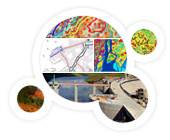You're in: Research » Research Groups » Environmental and Socio-economic Dynamics: Management for Sustainability » Objectives
Objectives
The main objectives of this Research Group are to
- understand the relationship between environmental and social dynamics, especially in ecologically fragile and/or socially disadvantaged areas;
- identify and analyse the factors that determine sustainability in an integrated perspective;
- study societal responses to socio-environmental problems;
- propose new forms of resource management, including novel governance approaches.
The research is clustered in three themes: Regional and Local Development; Environmental Change, and Natural Resources Management. The Group defined a strategy for each of these, which is briefly described below:
REGIONAL AND LOCAL DEVELOPMENT. Research under this theme is concerned with understanding the factors that enable and constrain sustainable development at the local and regional scales. It recognises that sustainable development is context specific and is determined by a combination of endogenous characteristics and exogenous processes. We plan to expand work analysing the potential and limitations of key local and regional development initiatives, including sustainable tourism, organic farming, economic development through clusters, and strategies to address urban poverty.
ENVIRONMENTAL CHANGE. This research theme deals with the dynamics of environmental change, and how can society best respond to change in order to promote, maintain or improve sustainability. It is drawn on a range of theories and concepts to understand interactions between society and the environment, including political ecology and the emerging science of complex adaptive systems and resilience. The Group will expand work on climate change and its governance implications; land degradation; and environmental change and human migration.
NATURAL RESOURCE MANAGEMENT, including soils, water and biodiversity, which are important elements of territorial sustainability. The Group intends to consolidate and expand theoretical and empirical work on new forms of resource governance, paying particular attention to governance models based on stakeholder participation and transboundary collaboration. Case-studies and comparative perspectives will be employed to identify general trends and build grounded theory about enabling conditions for co-operative governance at different scales.

Events
June 2025
| S | M | T | W | T | F | S |
|---|---|---|---|---|---|---|
| 1 | ||||||
| 2 | 3 | 4 | 5 | 6 | 7 | 8 |
| 9 | 10 | 11 | 12 | 13 | 14 | 15 |
| 16 | 17 | 18 | 19 | 20 | 21 | 22 |
| 23 | 24 | 25 | 26 | 27 | 28 | 29 |
| 30 |

